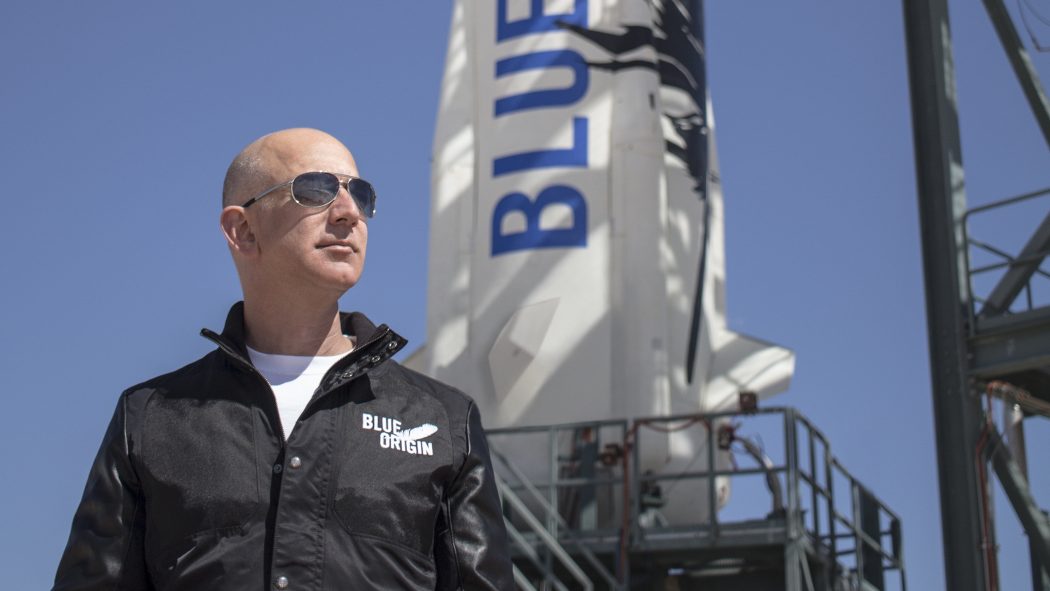When we look up into the night sky, we see the stars, littered across the large black expanse that we call “space”. On some nights, those stars seem so close that we could grab hold of them, but as we know, they exist much farther away than we could fathom. For the longest time, all humans could do was theorize about what existed beyond our planet- Many of these theories have been disproven over the passage of time. However, the progression of civilization and scientific techniques over the past century has generated a meteoric rise in our understanding of space. We sent rocket ships into the great expanse, we sent people to the moon, and now, individuals and companies around the world that are working to bring space closer to human beings than it has ever been.
Earlier in February, Jeff Bezos announced that he would be stepping down from his position as CEO of Amazon and stepping into the role of Executive Chairman. While this is a common trend in tech companies that have managed to find success, Bezos’ transition signalled more than just a change in leadership. It indicated that Bezos, one of the richest people in the world, would officially be joining the commercial space race, devoting his newfound time and resources to his space company, Blue Origin.
…forward progress of space exploration, space travel would not need to be reserved to the jurisdiction of nation-states but instead could be privatized, financed by companies with the resources to undertake these projects…
There are some key points that need to be understood about the industry and the competition to understand why Bezos’ involvement is impactful. The commercial space industry began with the idea that one day, space would no longer be an unknown. With the continued, forward progress of space exploration, space travel would not need to be reserved to the jurisdiction of nation-states but instead could be privatized, financed by companies with the resources to undertake these projects. Of course, companies would not join the space race without incentive, especially given the immense upfront cost necessary to even enter the industry. However, the success of one company has caused the industry to boom–Elon Musk’s SpaceX.
SpaceX was founded in 2002 to commercialize the space industry, creating a hub of innovation that would pave the way for future generations to one day explore and inhabit other planets in our solar system. Since then, SpaceX has been responsible for multiple historical milestones in the space industry starting in 2008, when it launched the first-ever privately developed rocket into Earth orbit. Subsequently, SpaceX was the first company to take cargo to the International Space Station via commercial spacecraft, launched satellites into low-Earth orbit that revolutionized the telecommunications industry, and now plans to develop reusable spacecraft that can not only land back on Earth but can be retooled for future launches.
Through the endeavours and success of SpaceX, there has been a worldwide realization of the possibilities of the space industry. Space tourism, satellite launch/service and government partnerships are just a few of the opportunities available, and there are more and more companies that are taking the step forward to capture these opportunities.
While [Blue Origin] has fallen behind, Bezos has made it clear that his motto for the company is, “Slow is smooth, and smooth is fast”
So, where does Blue Origin come in? Well, it was actually founded before SpaceX in 2000 when Bezos decided to invest $1-billion a year into his dream company, a company that would take space exploration to new heights through the private sector. However, with the massive success of Amazon, Blue Origin took a backseat and SpaceX took the lead, rising to the forefront of the commercialization of space. Instead of taking SpaceX head-on in the space of innovation, Blue Origin has focused its direction on developing the infrastructural components that will drive further innovation from start-ups in the future, While it has fallen behind, Bezos has made it clear that his motto for the company is, “Slow is smooth, and smooth is fast”. The goal of Blue Origin is not to win the current race, but to build a stadium for future competitors to one day use in the race of the future. With more than enough capital to fund his ventures, Bezos is now a major player in the space industry against SpaceX, albeit with different goals, and it will be interesting to see what moves Blue Origin makes in the coming months as the space race continues.








